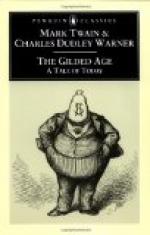They laid out the town liberally, not lacking room, leaving space for the railroad to come in, and for the river as it was to be when improved.
The engineers reported that the railroad could come in, by taking a little sweep and crossing the stream on a high bridge, but the grades would be steep. Col. Sellers said he didn’t care so much about the grades, if the road could only be made to reach the elevators on the river. The next day Mr. Thompson made a hasty survey of the stream for a mile or two, so that the Colonel and Harry were enabled to show on their map how nobly that would accommodate the city. Jeff took a little writing from the Colonel and Harry for a prospective share but Philip declined to join in, saying that he had no money, and didn’t want to make engagements he couldn’t fulfill.
The next morning the camp moved on, followed till it was out of sight by the listless eyes of the group in front of the store, one of whom remarked that, “he’d be doggoned if he ever expected to see that railroad any mo’.”
Harry went with the Colonel to Hawkeye to complete their arrangements, a part of which was the preparation of a petition to congress for the improvement of the navigation of Columbus River.
CHAPTER XVIII.
Eight years have passed since the death of Mr. Hawkins. Eight years are not many in the life of a nation or the history of a state, but they maybe years of destiny that shall fix the current of the century following. Such years were those that followed the little scrimmage on Lexington Common. Such years were those that followed the double-shotted demand for the surrender of Fort Sumter. History is never done with inquiring of these years, and summoning witnesses about them, and trying to understand their significance.
The eight years in America from 1860 to 1868 uprooted institutions that were centuries old, changed the politics of a people, transformed the social life of half the country, and wrought so profoundly upon the entire national character that the influence cannot be measured short of two or three generations.
As we are accustomed to interpret the economy of providence, the life of the individual is as nothing to that of the nation or the race; but who can say, in the broader view and the more intelligent weight of values, that the life of one man is not more than that of a nationality, and that there is not a tribunal where the tragedy of one human soul shall not seem more significant than the overturning of any human institution whatever?
When one thinks of the tremendous forces of the upper and the nether world which play for the mastery of the soul of a woman during the few years in which she passes from plastic girlhood to the ripe maturity of womanhood, he may well stand in awe before the momentous drama.




